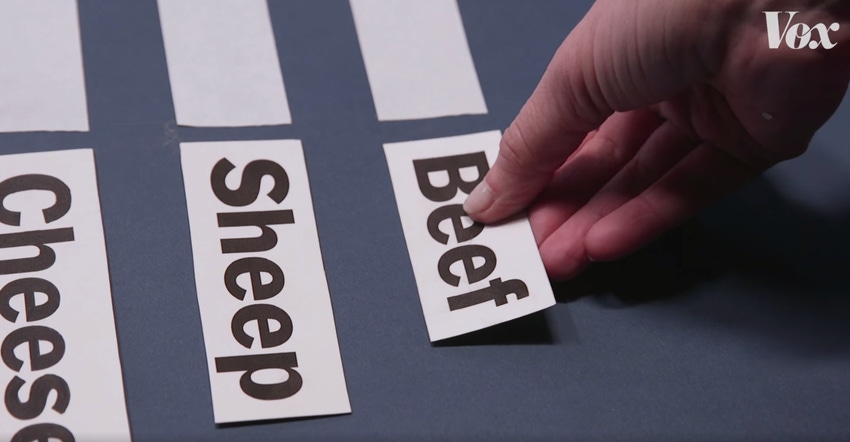“Climate fires” a good excuse to target beef cattle, again.
Beef is under attack again as climate activists argue that meat eating is destroying the planet.
September 15, 2020

As the wildfires (dubbed “climate fires”) rage on, there’s another battle taking place. It’s the battle of your dinner plate and your personal freedom to choose the best diet that works for your health, your budget, your taste preferences and your values.
The way we eat has become incredibly politicized in recent years, and animal products have been on the chopping block for decades.
The first blow came when the Dietary Guidelines for Americans were created and demonized saturated fats from animal products. And the fast-moving trend is that meat destroys our health and the planet.
I naively thought as the world shut down to wage a battle against a novel virus that the climate and cattle myth would die down for a minute, and it did. However, with less than 50 days until the election, we are reminded that climate change is on the ballot, and the implication is if you eat beef or drink dairy, you are destroying our natural resources.
Don’t believe me? Let me give you a few recent examples.
In response to the “climate fires” rapidly consuming the western United States, Facebook created an entire page dedicated to climate change. It’s the first thing you see when you sign onto the platform. Curious, I clicked on it to see what types of information I might find.
I was disappointed but not surprised to discover the first vlog featured on this Facebook-endorsed page. Published by Vox, the video was titled, “The food to avoid if you care about climate change.”
Any guesses what topped the list? Yes, you got it right — beef. Despite the fact that this misconception has been debunked over and over again until we are blue in the face, the popular rhetoric remains solidly in place. If you want to save the world, you’ve got to eat your way out of climate change. And you can start by skipping beef.
With 2,000 reactions and 800 comments, the sinister and erroneous video is gaining traction. As much as I hate to give it any more views, it would be awesome if you would all head there and join the conversation in the comments section.
Share the facts about cattle and environmental stewardship, and let’s shift the conversation in a positive, factual way! Be polite and considerate, but don’t spare the facts. Click here for a refresher on facts you can share.
My second example comes from Prevention Magazine. Several readers alerted me to this troubling publication, which featured an op-ed titled, “Why cutting back on beef is great for the planet.”
Sarah Smith, Prevention content director, informs readers, “Despite some people's affinity for beef, mounting evidence suggests that cutting back is smart for us and the planet. So, as of September 2020, Prevention's test kitchen will no longer create any new recipes containing beef. To do our part in helping our readers choose beef more mindfully, we will put our focus on other types of protein."
Are you sick to your stomach yet? I know I am.
Meanwhile, fake meat corporations and slick Silicon Valley investors are trying to disrupt the marketplace with their plant-based patties and petri-dish proteins. With a solid smear campaign greasing the runway for them, these companies are ready to land in the lead as America’s protein of choice.
IDTechEx says plant-based and cultured meats are the future, with novel meat substitutes expecting to exceed $30 billion by 2030.
Dr. Michael Dent writes, “In its current form, the meat industry is unsustainable. It is an inefficient way to produce food that may soon be unable to adequately feed the growing global population, which could reach 10 billion by the year 2050. Meat production is damaging to the environment too, contributing to climate change, dwindling water supplies and environmental pollution.
“Despite this, global meat consumption is still growing and people are eating more meat than ever. It's unlikely the global population will turn vegan. Realistic and affordable replacements for meat will be necessary before a significant shift away from the conventional meat industry is likely to happen.”
On Monday, I shared resources and groups that highlighted this reality—if we are to shape hearts and minds in society about who we are in animal agriculture, we need to continue to do good work and good deeds in our communities. And then share those with the world.
Naturally, this is an area our agricultural industry shines bright in. It’s only natural for us to care for our livestock, care for the environment and care for the people around us.
But how can we possibly counter this onslaught of absolute hate rhetoric against who we are and what we produce? I’ve said this hundreds of times on this blog in the last 13 years, but I’ll say it again — we NEED strong voices to get involved in these conversations.
My friends, if this rhetoric isn’t a wakeup call of what’s to come, I don’t know what is. If you want to maintain your right to own and manage your private land, to own and take care of your personal livestock and to choose the meat, dairy and eggs to nourish yourself and your family, we need to wake up, step up and start leading the conversations.
These false narratives are only getting stronger, but the truth is on our side. Let’s get to work.
The opinions of Amanda Radke are not necessarily those of beefmagazine.com or Farm Progress.
About the Author(s)
You May Also Like




.png?width=300&auto=webp&quality=80&disable=upscale)
